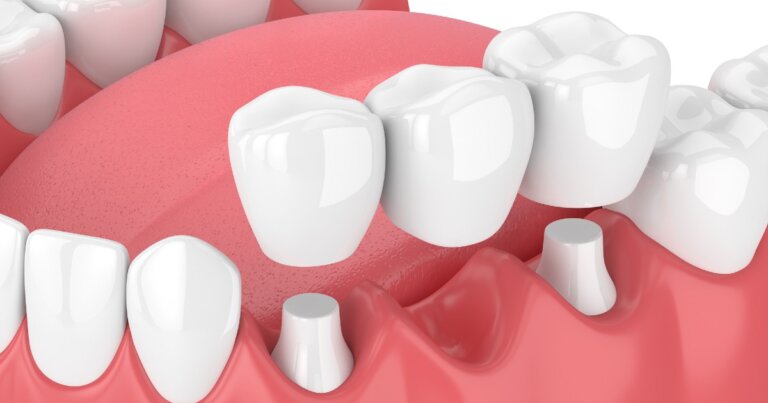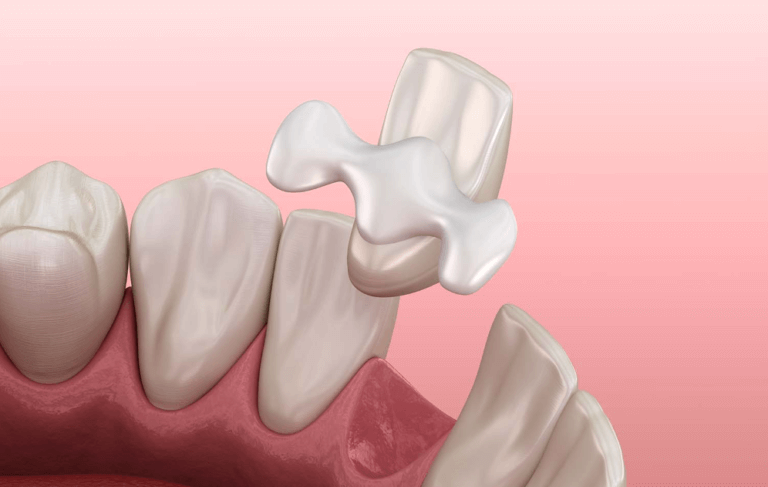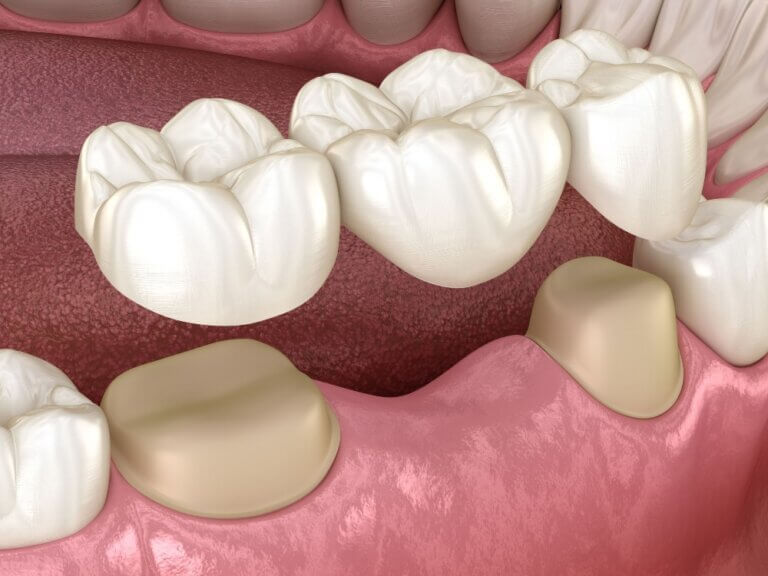Dental Bridge Recementation

What Is Dental Bridge Recementation?
Dental bridge recementation is the process of reattaching a loose or dislodged dental bridge. Over time, the bonding material that holds the bridge in place may weaken, or external factors like trauma or decay can cause the bridge to become unstable. Recementation restores the bridge’s fit, ensuring it remains functional and comfortable. Before deciding on whether Dental Bridge Recementation are right for you, there are some things you should know:
- Who Needs Dental Bridge Recementation?
- Benefits of Dental Bridge Recementation
- Alternatives to Dental Bridge Recementation
- How Much Does Dental Bridge Recementation Cost?
- Steps In The Dental Bridge Recementation Procedure
- Frequently Asked Questions About Dental Bridge Recementation
If you have any further questions about Dental Bridge Recementation or other dental services offered at Atlas Dental, please contact us.

Free phone consultation
Are you missing teeth and have questions about Dental Bridges? Schedule a free phone consultation with our GTA dentist.

5 star google reviews
Our patients love us! See why people are choosing Atlas Dental for Dental Bridges.

Book Emergency Bridge visit online
Have a problem with your Dental Bridge? Book An Emergency Dental Appointment Online.
Who Needs Dental Bridge Recementation?
You might need dental bridge recementation if:
- Wear and Tear: Daily chewing and grinding can weaken the adhesive holding your bridge in place over time.
- Poor Initial Bonding: Sometimes, the initial placement of the bridge may not have bonded as strongly as needed, causing the bridge to loosen prematurely.
- Tooth Decay: If the tooth beneath the bridge starts to decay, the bridge may lose its stability.
- Accidents or Trauma: Injuries to the mouth from sports or falls can cause a dental bridge to come loose.
- Bite Changes: Shifts in your teeth or bite alignment can disrupt the fit of your dental bridge.
If your dental bridge has become loose, prompt recementation is crucial to avoid further complications like tooth decay, gum disease, or even tooth loss. If you have further questions about Dental Bridge Recementation, please contact us.

Benefits of Dental Bridge Recementation
Dental bridge recementation comes with several advantages:
- Protects Your Natural Teeth: By securing a loose bridge, you safeguard the underlying tooth from further damage, decay, or infection.
- Restores Chewing Function: A loose bridge can interfere with chewing and speaking. Recementation restores proper function.
- Maintains Smile Aesthetics: Dental bridges are designed to blend seamlessly with your natural teeth. Recementing the bridge ensures that your smile remains flawless.
- Prevents Sensitivity: A loose bridge can expose sensitive areas of the tooth, leading to discomfort. Recementation protects these areas.
- Cost-Effective: Prompt recementation helps you avoid more costly procedures like bridge replacement or tooth extraction.
If you suspect that your dental bridge is loose or dislodged, schedule an appointment with your dentist as soon as possible. If you have further questions about Dental Bridge Recementation, please contact us.
Alternatives to Dental Bridge Recementation
If dental bridge recementation is not an option, alternative treatments may include:
- Dental Bridge Replacement: In cases where the bridge is damaged or doesn’t fit anymore, a new bridge may be necessary.
- Dental Implants: If the underlying tooth cannot support the bridge, a dental implant may be recommended.
- Dentures: If multiple teeth are affected, partial or full dentures could be a suitable replacement option.
It’s important to note that each alternative treatment comes with its own considerations, benefits, and potential drawbacks. Dental professionals will carefully assess your oral health, the condition of the bridge, and the underlying tooth before recommending the most suitable course of action. If you have further questions about Dental Bridge Recementation, please contact us.
Cost of Recementation for Dental Bridge
The cost of a recementing a dental bridge starts at $217 and will depend on the amount of time it takes the dentist to perform this procedure. The codes relevant to dental crowns in the Ontario Dental Association’s Suggested Fee Guide appear as follows:
Repairs,Reinsertion/Recementation (i.e. Conventional Dental Bridge)
- 66302 – Two Unit of Time (30 minutes): $217
- 66303 – Three Unit of Time (45 minutes): $326
- 66304 – Four Unit of Time (60 minutes): $434
The recementation of a dental bridge is usually considered a basic restorative procedure covered by your dental insurance. Be sure to find out from your dental insurance plan provider how much you are eligible for before going ahead with dental treatment. Your dentist can help you submit an predetermination to your dental insurance. Our fees are consistent with the ODA Fee Guide.
For patients without dental insurance, Atlas Dental is pleased to offer dental financing through iFinance Dentalcard. Affordable payment plans start at 7.95% for terms of 6 months to 6 years. To learn more about Dentalcard dental treatment financing, follow this link.
Steps In The Dental Bridge Recementation Procedure
Here’s what to expect during a dental bridge recementation procedure:
- Examination: The dentist will assess the bridge and underlying tooth to confirm if recementation is possible.
- Bridge Removal and Cleaning: The loose bridge is removed, and any debris or old adhesive is cleaned off both the bridge and the supporting teeth.
- Reapplication of Adhesive: New dental cement is applied to the bridge.
- Reattachment: The bridge is positioned back in place and checked for proper fit.
- Bite Adjustment: The dentist will ensure your bite is comfortable and make any necessary adjustments.
- Curing and Bonding: A curing light is used to set the dental cement, securing the bridge in place.
- Final Polishing: The bridge is polished to blend seamlessly with your teeth.
If you experience any discomfort or notice any issues with your recemented bridge after the procedure, it’s important to contact your dentist promptly for further evaluation and adjustments. If you have further questions about Dental Bridge Recementation, please contact us.

Frequently Asked Questions About Dental Bridge Recementation
- Is the recementation procedure painful?
The procedure is generally not painful. Local anesthesia may be used to ensure comfort during the process.
- Can all loose dental bridges be recemented?
Not always. The ability to recement a bridge depends on factors like the condition of the bridge and supporting teeth. A dental evaluation is necessary to determine the appropriate course of action.
- Is the recementation procedure safe?
Yes, it is a safe and routine procedure performed by dentists to ensure the proper function and fit of the dental bridge.
- How can I prevent my dental bridge from loosening again?
Preventive measures include maintaining excellent oral hygiene, avoiding sticky or hard foods, addressing teeth grinding with a night guard, and attending regular dental check-ups.
Dental bridge recementation is a reliable solution to restore the stability and function of a loose bridge, helping to maintain your oral health. If you have further questions about Dental Bridge Recementation, please contact us.

